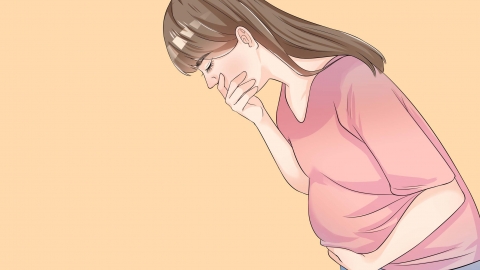What causes dizziness and vomiting in early pregnancy, and what should be done about it?
Feeling dizzy and vomiting early in the morning after becoming pregnant may be caused by early pregnancy reactions, orthostatic hypotension, anemia during pregnancy, gestational hypertension, acute gastroenteritis, etc. Symptoms can be improved through dietary adjustments, slow changes in posture, and medication. If symptoms frequently worsen or are accompanied by blurred vision or severe abdominal pain, prompt medical attention is necessary.
1. Early pregnancy reactions: After conception, significant hormonal changes in the body stimulate the gastrointestinal tract, causing discomfort. Symptoms are more noticeable upon waking and manifest as dizziness, nausea, and vomiting. It is recommended to eat small, frequent meals; drink a cup of warm honey water before getting up to avoid an empty stomach; and choose light, easily digestible foods.
2. Orthostatic hypotension: During pregnancy, blood vessels dilate. Suddenly standing up in the morning causes a sudden drop in blood pressure, leading to insufficient blood supply to the brain and resulting in dizziness, possibly accompanied by temporary vision darkening. It is advised to rise slowly from bed, sit for a moment before standing, avoid rapid postural changes, and maintain adequate daily fluid intake.

3. Anemia during pregnancy: Increased iron requirements during pregnancy, insufficient intake, or poor absorption can lead to reduced hemoglobin levels, causing cerebral hypoxia and resulting in dizziness, fatigue, and pallor. It is recommended to take medications such as polysaccharide-iron complex capsules, ferrous succinate tablets, and vitamin C tablets under medical guidance to improve symptoms.
4. Gestational hypertension: Vasoconstriction during pregnancy leads to elevated blood pressure, affecting cerebral blood flow and causing dizziness, possibly accompanied by blurred vision and lower limb edema. Under medical supervision, medications such as labetalol tablets, methyldopa tablets, or nifedipine sustained-release tablets may be used to alleviate symptoms.
5. Acute gastroenteritis: Reduced immunity during pregnancy combined with unhygienic diet can lead to intestinal infection. Inflammatory stimulation results in vomiting, along with dizziness and diarrhea. Patients may follow medical advice to use medications such as montmorillonite powder, oral rehydration salts III, and bifidobacterium triple viable capsules to relieve discomfort.
Maintain regular作息 (作息 should be replaced with "作息" → "sleep schedule"), ensure sufficient rest, practice hygienic eating habits with balanced, light, and nutritious meals, move slowly when getting up in the morning, avoid overexertion, engage in moderate walking to strengthen physical health, and closely monitor bodily changes to support a healthy pregnancy.




